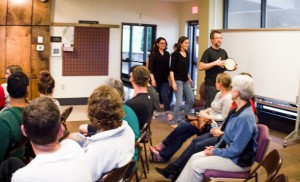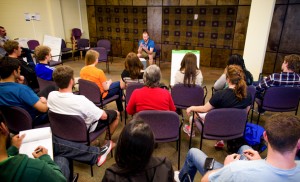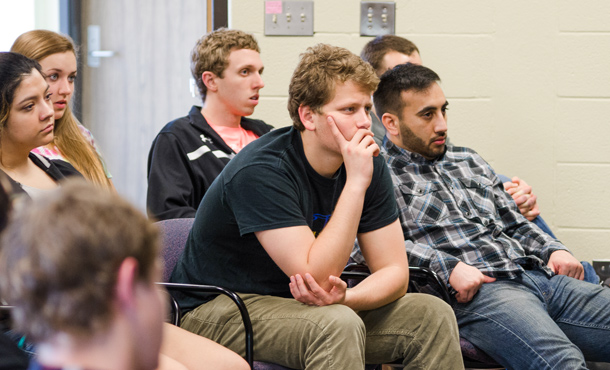What if a traumatic childhood event could be contributing to health problems? Wouldn’t listening and learning from a patient about that experience be as valuable for diagnostic purposes to a health care professional as evaluating a high temperature, sore glands or a skin condition?
A two-day transdisciplinary seminar melding theater and narrative arts and the health sciences in April at Eastern Mennonite University (EMU) drew students into interactions that explored these questions, using strategies of responsive listening and collaborative teaching. The event was part of the “Silent Violence” research project, led by professor Carolyn Stauffer and supported by a Just Pax Fund grant, which focuses on abuse and strategies of resilience.

The community of approximately 60 learners included graduate students in the MA in biomedicine program, undergraduate students in various health science courses, trained facilitators from the Pennsylvania-based non-profit GuideSpring, and a group of actors from Inside Out, EMU’s playback theater group.
The focus of the workshop, said Stauffer, was the mind-body connection from a health sciences perspective. “All life experiences are filtered through our neurological and biological systems. If we are not intentional about addressing unresolved issues, they play out in very negative ways on our health. Our goal in this seminar was to help students make that connection. When we surface and share our stories, we can build community and work towards resolution and resilience in ways that then offload the negative impacts from our bodies.”
The transdisciplinary emphasis brought together Stauffer, who teaches in the MA in biomedicine program, and playback theater troupe co-founders Roger Foster and Heidi Winters Vogel, also a professor of theater.
“The collaboration between people who would identify as scientists and people who identify as artists is very exciting,” Foster said, pointing out that the workshop created a space where both are valued equally.
Listening as a ‘diagnostic tool’
After the event, students talked about connecting with their fellow students in ways they’d never experienced, and how sharing their own stories helped them move toward healing in their own lives.
The ability to listen and show empathy is a unique diagnostic tool with a different sensitivity than a blood pressure cuff or an EKG machine, said one student.
“By listening to stories of others, I have been able to see the impact of ACEs on the individuals they are today,” said Wally Al-Kakhan, MA ’15 (biomedicine), adding that the experience helped him understand both himself and his fellow classmates better.
The workshop helped biology major Grayson Mast understand the benefits of a holistic approach to healthcare , as well as contributing to a foundational understanding of psychosocial trauma. “We all have moments in our past that have torn us down and made life more difficult. Learning how to affirm someone’s ability to discuss a traumatic event in their life is really important,” said Mast, who hopes to go to medical school.
When contacted for an interview several weeks after the seminar, Mast said that the workshop was “one of the most important educational events of my first year at EMU.”
Sharing ‘deep’ stories

The seminar began with a playback storytelling event that surfaced stories of adverse childhood experiences (known as ACE’s). Playback theater is a kind of collaborative art in which members of the audience volunteer to tell a story and then watch as the actors “play back” an interpretation of the event. But before that happened, the group led a series of informal interactions that helped to build community, and to voice and normalize natural tensions and unease about the topic and the format.
“We heard everything from ‘I don’t understand’ to ‘It’s really difficult to talk about this’ to ‘This makes me nervous’ and even ‘I’m irritated that I have to give up my weekend for this,’” Foster said.
Although specific stories cannot be shared because of confidentiality, Foster says one general story about a father spending time with his children provides an example of what the audience heard. “This seemingly positive story of a really good day was actually very painful, because that parent had been very neglectful, and that one wonderful day was a marker of what this person had been without,” Foster said. “The story really opened the audience to the possibilities and the idea that all stories have meaning.”
The next day was dedicated to work in small groups — telling, listening, and responding to stories. Mike Yoder, co-founder of Guidespring and a facilitator of similar events for 14 years, says he was moved by the depth of responses from the students.
“To watch them share with their friends and embrace them with really powerful responses was a very moving experience,” Yoder said. “I heard them say things like ‘I didn’t know that happened’ or ‘That breaks my heart’ or ‘I’m amazed that you lived through that but it hasn’t defined you.’ Watching them make those connections, to show sadness for what they’d experienced but then also identifying with their strength—they were truly thrilled by the experience of building those relationships of trust.”

At the end of the seminar, the group participated in a second theater event that focused on audience members’ stories of change and resilience.
“We wanted them to think about strategies to move forward, and the networks of people they rely on to help them move forward,” Stauffer said, linking the students’ experiences to what she’s learned from her research of resilience strategies among domestic violence survivors in communities of homeless women, undocumented Latinas and Mennonite women from Old Order or conservative church communities.

What a fantastic event, overjoyed Inside Out could participate! Mike Yoder and the other Guidespring folks and Carolyn Stauffer are doing difficult but important work. Bless you my friends and colleagues.